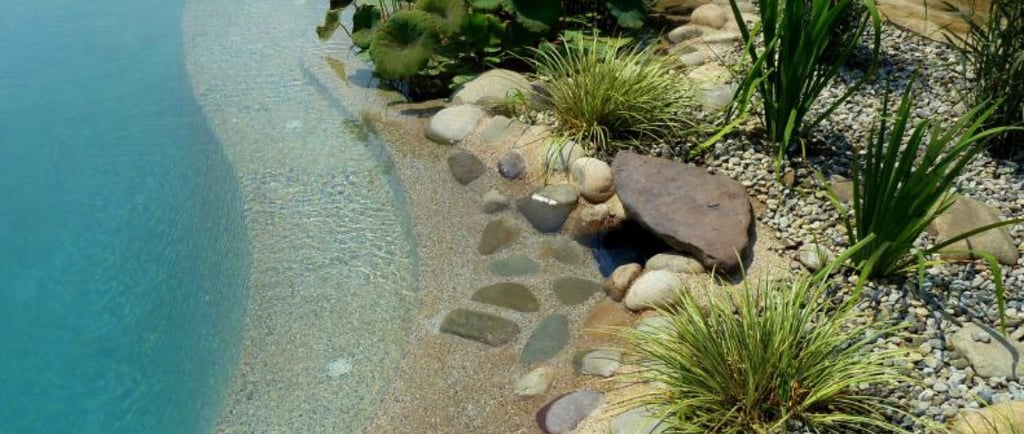Zoom Info Session Thursday February 26, 2026 5:30-6:30PM Mountain Time
Natural Pools: A Sustainable, Chemical-Free Alternative for Swimming
In recent years, the desire to embrace more eco-friendly and sustainable lifestyles has sparked interest in natural pools—swimming pools filtered by plants rather than chemicals. Natural pools, also known as natural swimming ponds, offer a harmonious blend of aesthetics and functionality. They eliminate the need for chlorine, bromine, or other chemicals that many conventional pools rely on for water purity. Instead, they create a self-sustaining ecosystem that uses aquatic plants, beneficial bacteria, and biological filters to maintain clean, clear water.
Gratitude Village
10/9/20243 min read


Natural Pools: A Sustainable, Chemical-Free Alternative for Swimming
In recent years, the desire to embrace more eco-friendly and sustainable lifestyles has sparked interest in natural pools—swimming pools filtered by plants rather than chemicals. Natural pools, also known as natural swimming ponds, offer a harmonious blend of aesthetics and functionality. They eliminate the need for chlorine, bromine, or other chemicals that many conventional pools rely on for water purity. Instead, they create a self-sustaining ecosystem that uses aquatic plants, beneficial bacteria, and biological filters to maintain clean, clear water.
This unique concept not only promotes a more sustainable way of living but also enhances the beauty of a backyard or communal space, providing a sanctuary that is healthier for humans, animals, and the environment. If you’re considering a natural pool or are just curious about how they work, let’s dive deeper into the benefits, functionality, and design options of these chemical-free swimming spaces.
How Natural Pools Work
At the heart of a natural pool’s design is its regenerative system, which mimics the way a pond or lake naturally filters and purifies itself. The pool is divided into two zones: the swimming zone and the regeneration zone.
Swimming Zone: This is the area designated for swimming. It looks similar to a traditional pool, but the water isn’t chemically treated. Instead, it’s drawn into the regeneration zone where nature does its magic.
Regeneration Zone: In this part of the pool, plants, gravel, and other natural materials create a wetland-like environment. These plants filter the water by absorbing nutrients and breaking down contaminants. Aquatic plants—such as water lilies, reeds, and sedges—not only add aesthetic value but also serve as natural filters, purifying the water and keeping it free from algae and harmful bacteria.
Biological Filtration: Along with the plants, beneficial bacteria grow in the gravel and other porous materials in the regeneration zone. These bacteria break down organic matter, preventing the buildup of debris and contributing to a balanced ecosystem. The system is completed with circulation pumps that move the water between the swimming and regeneration zones, ensuring constant filtration.
Benefits of Natural Pools
Chemical-Free Swimming: One of the main attractions of natural pools is the absence of chlorine and other harsh chemicals. Chlorine, although effective in killing bacteria, can irritate the skin, eyes, and respiratory system, especially for people with sensitivities. Natural pools offer a more comfortable and healthier swimming experience.
Eco-Friendly Design: Natural pools are not only beneficial to their users but also to the environment. By eliminating chemical use, natural pools reduce harmful runoff into surrounding soil and water sources. The plants in the regeneration zone also help to create habitats for local wildlife such as frogs, birds, and beneficial insects.
Aesthetic Appeal: Unlike the bright blue of traditional pools, natural pools offer a more organic look, often blending seamlessly with the landscape. The regeneration zone, with its aquatic plants, looks like a natural pond or water garden, adding beauty and tranquility to the environment. The ability to design pools in various shapes and styles allows homeowners or communities to customize them to fit their outdoor space.
Low Maintenance: Though natural pools require more care during the first year to establish a balanced ecosystem, they become relatively low-maintenance once the plants and bacteria are thriving. The natural filtration system means less debris buildup, and the need for constant water testing and chemical balancing is eliminated. Plus, since the plants absorb nutrients, they reduce the risk of algae growth, a common problem in conventional pools.
Cost Efficiency: While the upfront cost of building a natural pool can be higher than that of a traditional one, the long-term savings are significant. Without the need for chemicals, electricity for heating, and regular maintenance, natural pools are more cost-effective over time.
Designing Your Natural Pool
When designing a natural pool, the possibilities are nearly endless. Whether you want a minimalist, modern look or a rustic pond-like appearance, the design can be tailored to your personal style. Considerations such as climate, available space, and local plant varieties will play a role in shaping your pool.
Shape and Size: Natural pools can take on any shape, from rectangular to freeform designs. Smaller properties can opt for compact designs, while larger areas may accommodate expansive ponds.
Plant Selection: Choosing the right plants is essential for both the aesthetic and the filtration capacity of your pool. Native aquatic plants are often the best choice, as they’re already adapted to the local environment and can thrive without intensive care.
Seasonal Considerations: Natural pools can be designed to accommodate different climates. In colder regions, they can be winterized, and in warmer regions, they may provide year-round enjoyment.
Natural pools offer a sustainable, eco-friendly alternative to traditional pools, combining beauty with functionality. They provide a serene swimming experience free from chemicals, while promoting biodiversity and enhancing your landscape. Whether for a private backyard or a shared community space, natural pools are a perfect choice for those committed to sustainability, nature, and health. By harnessing the power of plants and natural ecosystems, they represent a future where swimming is both enjoyable and environmentally responsible.
COMMUNITY
Join us in embracing nature, diversity and connection.
Sustainability
DIVERSITY
info@gratitudevillageco.com
720-689-4821
© 2026. All rights reserved.
AFFORDABILITY
Gratitude Village Inc. is a 501(c)3 charitable corporation (public charity) that values diversity, equity and inclusion as essential to our mission. EIN #33-2499522
Subscribe to our Substack
Refund Policy




Gratitude Village is a Proud Member of these organizations
